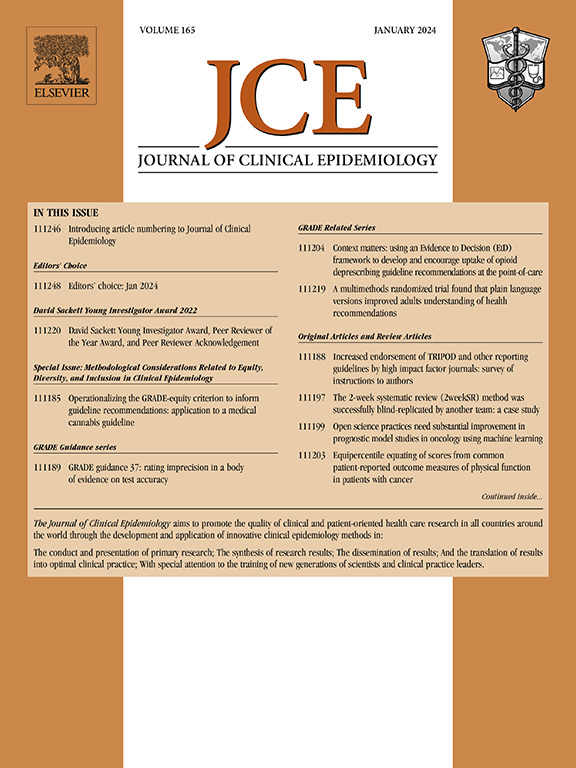Scoping review of registration of observational studies finds inadequate registration policies, increased registration, and a debate converging toward proregistration
IF 7.3
2区 医学
Q1 HEALTH CARE SCIENCES & SERVICES
引用次数: 0
Abstract
Objectives
We aimed to examine a) the policies of national and international clinical trial registries regarding observational studies; b) the time trends of observational study registration; and c) the published arguments for and against observational study registration.
Study Design and Setting
Scoping review of registry practices and published arguments. We searched the websites and databases of all 19 members of the World Health Organization's Registry Network to identify policies relating to observational studies and the number of observational studies registered annually from the beginning of the registries to 2022. Regarding documents with arguments, we searched Medline, Embase, Google Scholar, and top medical and epidemiological journals from 2009 to 2023. We classified arguments as “main” based on the number (n ≥ 3) of documents they occurred in.
Results
Of 19 registries, 15 allowed observational study registration, of which seven (35%) had an explicit policy regarding what to register and two (11%) about when to register. The annual number of observational study registrations increased over time in all registries; for example, ClinicalTrials.gov increased from 313 in 1999 to 9775 in 2022. Fifty documents provided arguments concerning observational study registration: 31 argued for, 18 against, and one was neutral. Since 2012, 19 out of 25 documents argued for. We classified nine arguments as main: five for and four against. The two most prevalent arguments for were the prevention of selective reporting of outcomes (n = 16) and publication bias (n = 12), and against were that it will hinder exploration of new ideas (n = 17) and it will waste resources (n = 6).
Conclusion
Few registries have policies regarding observational studies; an increasing number of observational studies were registered; there was a lively debate on the merits of registration of observational studies, which, since 2012, seems to converge toward proregistration.
求助全文
约1分钟内获得全文
求助全文
来源期刊

Journal of Clinical Epidemiology
医学-公共卫生、环境卫生与职业卫生
CiteScore
12.00
自引率
6.90%
发文量
320
审稿时长
44 days
期刊介绍:
The Journal of Clinical Epidemiology strives to enhance the quality of clinical and patient-oriented healthcare research by advancing and applying innovative methods in conducting, presenting, synthesizing, disseminating, and translating research results into optimal clinical practice. Special emphasis is placed on training new generations of scientists and clinical practice leaders.
 求助内容:
求助内容: 应助结果提醒方式:
应助结果提醒方式:


